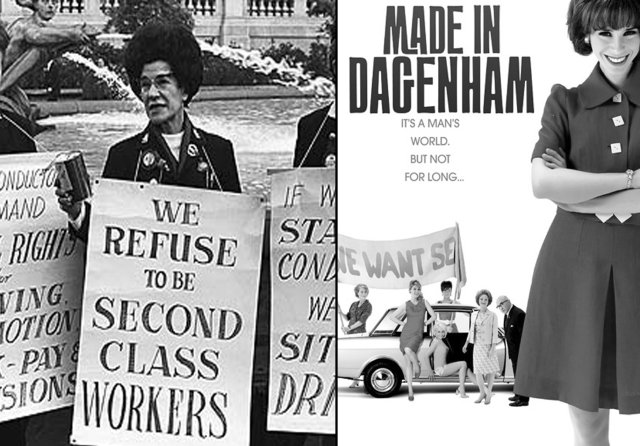
Made in Dagenham
Directed by Nigel Cole
Starring Rosamund Pike, Bob Hoskins, Miranda Richardson
In cinemas nationally
Review by Jeff Sawtell
Given the advance publicity, I was looking forward to Made in Dagenham. It is based on the 1968 strike of women sewing machinists at Ford Motors, which was supposed to have inspired the 1970 Equal Pay Act.
Made in Dagenham? More like made in Ealing, since it’s a film-fiction that has been described by some of the survivors as being “sexed up” and clearly doesn’t represent the political reality of the times.
That’s because director Nigel Cole (Calendar Girls) follows the formula of films like The Fully Monty, rather than the realism of the 1960 film Saturday Night And Sunday Morning or Ken Loach’s 1967 film Poor Cow.
The real-life working-class heroes included Lil Grisley, Sheila Douglas and Violet Dawson, along with two male Transport and General Workers’ Union (T&G) conveners Bernie Passingham and Frederick Blake who were sympathetic to their cause.
At the time, there were 55,000 men in the Essex plant and 187 women. The women worked for 70% of the male wage. They’d had enough, especially after being reclassified as non-skilled and working in decrepit conditions.
For the sake of dramatic licence, the names have been changed. We have Sally Hawkins playing Rita O’Grady, who is encouraged by her sympathetic shop steward Albert (Bob Hoskins) to represent the women.
Naturally, she’s an inspiration, even though she has to cope with her children and a working husband (Daniel Mays) who, after being initially impressed, begins to wilt as soon as he has to do a spot of ironing.
After a successful 24-hour strike, they’re encouraged to take it further. This provokes obstruction by some of the stone-faced union officials, especially when the draconian US Ford bosses threaten to shut down the plant.
This provides for the stuff of the drama, which includes everything from humour to a tragedy before a meeting with Barbara Castle (Miranda Richardson) sees them win a partial victory and the promise of an Equal Pay Act.
My criticism of the style is its flagrant disregard for the politics of the time.
Despite showing a worker reading the Morning Star, it’s suggested that the T&G resembled a bunch of Kremlin clones. This completely ignores the fact that the ban on communists holding office wasn’t lifted until 1968.
Then we have the Ford US boss describing “communists” as belonging to the “Socialist Workers Party, Workers Revolutionary Party and Revolutionary Communist Group”, despite the fact these groups didn’t exist at the time.
Ironically, while the issue is portrayed as inspiring Castle to introduce the Equal Pay Act, she was writing up the white paper In Place of Strife to shackle the unions in 1969 that led to the Tory’s Industrial Relations Act of 1971.
Never mind, it’s a feel-good film that couldn’t be more relevant given we’re yet again faced with an onslaught against working-class conditions to take us back to the stone age before we founded the welfare state.
[Reprinted from Morning Star.]